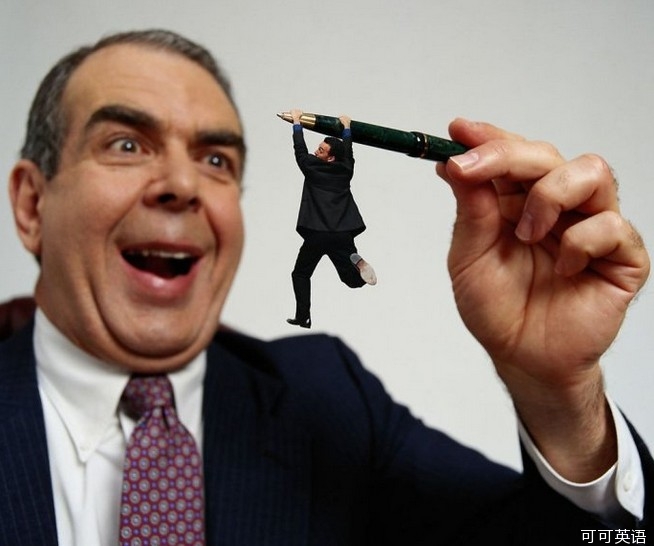(单词翻译:单击)

If you've been working for a while, odds are that you've noticed a paradox: The very same traits that make some people successful (up to a point) can backfire if carried too far. Maybe it's a boss who's so intent on treating everyone fairly that she rewards slackers the same as stars, so that the best performers quit. Or it could be the colleague who's so bent on achieving excellence in every tiny detail that higher-ups see him as too deep in the weeds for a promotion.
如果你已经工作了一段时间,你可能会发现一种悖论:让许多人(在一定程度上)大获成功的那些品质,如果太过出格,可能产生相反的效果。比如,一位老板太过专注于一视同仁,对懒惰的员工和明星员工给予相同的奖励,结果导致最优秀的下属跳槽。再比如,一位同事太过追求在每一个微小的细节上实现卓越,结果上司可能认为他是沉迷于争权夺利。
Recognizing "when your greatest assets turn into career-limiting liabilities" isn't easy, writes Jake Breeden, since "human nature, social norms, and corporate culture can all pull us toward the territory of unexamined virtues." A faculty member at Duke Corporate Education, a nonprofit executive-development offshoot of Duke University's Fuqua School of Business, Breeden has worked with managers at Microsoft (MSFT), Cisco (CSCO), Google (GOOG), IBM (IBM), and elsewhere on identifying the blind spots that hold them back. Now he's written a book about it,Tipping Sacred Cows: Kick the Bad Work Habits that Masquerade as Virtues.
杰克?布雷登写道,要想看清“最优质的资本什么时候会变成阻碍职业发展的障碍”并不是件容易的事,因为“人性、社会准则和企业文化,都可能将我们推向未曾证实过的、所谓“美德”的边缘。”布雷登是非营利性高管发展组织杜克企业教育学院(Duke Corporate Education)的教职员工,这间学院隶属于杜克大学富科商学院(Duke University's Fuqua School of Business)。布雷登曾与微软(Microsoft)、思科(Cisco)、谷歌(Google)、IBM等公司的管理层合作,致力于发现阻碍管理者职业发展的盲点。目前,他出版了一本关于这个话题的新书——《打到圣牛:踢爆披着美德外衣的职场坏习惯》(Tipping Sacred Cows: Kick the Bad Work Habits that Masquerade as Virtues)。
The sacred cows he's referring to -- all desirable in unlimited quantities, says the conventional wisdom -- are balance, collaboration, creativity, excellence, fairness, passion, and preparation. "When leaders embrace beliefs without understanding and managing the potential side effects, the beliefs become sacred cows," Breeden writes. Like the wandering herds that clog the streets of Japiur, they get in the way of progress. Consider, for instance, creativity. Analysts scratching their heads over why Sony (SNE) hasn't produced a hit product since the last century tend to blame the company's supposed lack of creativity. Breeden believes that just the opposite is true, and that Sony's "failures stem from too much creativity" -- or, more precisely, from creativity's dark side, arrogance.
他所指的“圣牛”是指传统观点认为所有人都渴求无限量拥有的品质,比如平衡、合作、创造力、卓越、公平、热情和准备。布雷登写道:“如果领导者坚持某些信念,但却不能理解和管理潜在的副作用,这些信念便变成了‘圣牛’。”就像斋普尔街头阻塞交通的那些四处游荡的牲畜一样,这些信念也会影响公司发展的进程。以创造力为例,上个世纪,索尼(Sony)未能生产出一款成功产品,分析师绞尽脑汁分析其中的原因,最后认为公司缺乏创造力才是罪魁祸首。但布雷登却认为事实恰恰相反,索尼“失败的根源在于创造力过盛”,或者更准确地说,是源于创造力的阴暗面——自大。
"Instead of listening to the market with humility, Sony's engineers crammed their best technology into an MP3 player that was too cumbersome to use. Instead of taking care of their customers' need for simplicity, they took care of their own engineers' need for complexity," Breeden writes. "Engineers inside Sony viewed the hard disk technology used in Apple's iPod as beneath them, so they went their own way. These innovators had brains full of ideas. Their problem wasn't too few ideas. Their problem was too much narcissism."
“索尼的工程师并没有谦逊地倾听来自市场的声音,而是把他们最好的技术一股脑地塞进一台MP3播放器中,结果导致产品太过烦琐,不易于使用。而消费者对简单的追求,索尼却视而不见,反而对公司工程师的需要非常重视,”布雷登写道。“索尼内部的工程师认为,苹果(Apple)iPod所用的硬盘技术远远落后于索尼,所以他们依然我行我素。这些创新者们满脑子都是创意。他们的问题不在于缺乏创意,而是太过自恋。”
Or take excellence, companies' Holy Grail, particularly since the publication of Tom Peters and Robert Waterman's In Search of Excellence. The evil twin of excellence, Breeden believes, takes over when the people in charge confuse the process with the outcome, because getting to a great result requires embracing some chaos and uncertainty along the way. "When leaders demand perfection even in the unimportant details of their workday, they waste emotional and intellectual energy," he writes. "Leaders too often demand excellence in small things because they lack the will to prioritize what matters most."
再以卓越为例。自从汤姆?皮特斯与罗伯特?沃特曼的《追求卓越》(In Search of Excellence)一书出版后,卓越便成为各大公司的“圣牛”。布雷登认为,当负责人将流程与结果混淆时,卓越的邪恶化身便会出现。因为要想达到伟大的结果,必须接受过程中的混乱和不确定性。他写道:“一旦领导者在每天的工作当中,对哪怕根本无关紧要的细节也要求做到尽善尽美时,他们其实是在浪费自己的情感和智力能量。通常情况下,领导者要求在小事上做到完美,是因为他们不愿意优先考虑什么事最为重要。”
Tipping over that particular sacred cow, Breeden says, takes a willingness to dive in and make mistakes, as in what Mark Zuckerberg has called Facebook's (FB) "hacker ethic." As Zuckerberg wrote in a letter to shareholders, "Instead of debating for days whether a new idea is possible or what the best way to build something is, hackers would rather just prototype something and see what works."
布雷登认为,要想打倒这些特殊的“圣牛”,需要心甘情愿潜下心来,敢于犯错,正如马克?扎克伯格对于Facebook“黑客伦理”的说法。扎克伯格在写给股东的一封信中说道:“黑客们不会花几天时间去争论新创意到底是否可行,或者什么才是打造产品的最佳途径。他们直接行动起来,动手去验证是否可行。”
Or look at Pixar, where animators routinely share unfinished scene sketches, including "very rough work that may not turn into anything usable," Breeden writes. "Each animator embraces the mess of progress, just as each one understands that there is no compromising on the quality of the finished product ... You must lower the day-to-day standards of work so that you can achieve the absolute highest standards at the end." Breeden's book offers practical advice on how to tame each of the sacred cows he sees as blocking people's best performance, but the exact point where a virtue goes bad is not always obvious. Curious about whether one of them might be holding back your own career? You can take a 21-question quiz at breedenideas.com/assessment.
或者再来看看皮克斯(Pixar)。皮克斯的动画师们会定期分享还没有最后定稿的场景草图,其中包括“可能没有任何用处的、非常粗略的作品,”布雷登写道。“每一位动画师都能接受过程中的混乱,因为每一个人都清楚,最终成品的质量不能打任何折扣……必须降低日常的工作标准,这样才能在最终达到真正的最高标准。”对于那些妨碍人们实现最佳表现的“圣牛”,应该如何将他们“驯服”呢?布雷登的书中提出了非常实用的建议。但我们并不清楚某一种品质会在什么情况下会变成障碍。想知道自己的职业可能会受到哪种品质的阻碍,不妨点击breedenideas.com/assessment,回答21个问题。


